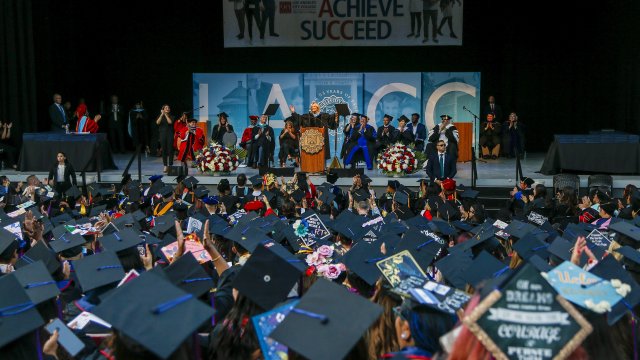The rules of the college game have changed.
Surveys show more students think that buying into education isn’t paying off.
The number of high schoolers considering a four-year education plummeted from 71 percent to 48 percent since the start of the pandemic. Many people with 4-year degrees say it paid off because of the career they chose.
"40 percent of people will get BAs, will make more than people who get graduate degrees, because they're in the right field of study," said Anthony Carnevale, Director of Georgetown's Center on Education and Workforce.
Some companies are rethinking their need for four-year degrees, but economists don’t want prospective students to take away the message that college isn’t a good option.
The numbers from Georgetown show that lifetime earnings do increase with the right degree, and will put you ahead in the job search.
That’s why economist Beth Akers recommends you consider not only the type of higher education, but what you decide to study — and how that will affect your financial future.
"Are you going to be okay if you go down this path so that you can still live the life that you want and that's a question that we don't often answer," Akers said. "College does deliver a lot of good returns for a lot of people who go."
More education doesn’t always mean better opportunities.
Data from U.S. News shows average tuition and fees can range from $41,000 to over $150,000 over four years, depending on what type of school you go to.
The average salary for recent grads is just over $55,000, according to the National Association of Colleges and Employers, a nonprofit organization.
More employers seem to be taking note, and are reconsidering what role education plays in hiring.
Researcher Manjari Raman tells Newsy that employers are shifting away from a phenomenon called "degree inflation."
Manjari says as jobs got more sophisticated, fewer workers had the ability to work with new technology.
So more employers started requiring four-year college degrees for jobs that historically didn’t require college-level skills.
Burning Glass Institute, an independent nonprofit research center, said workplaces used four-year degrees as a baseline for workplace readiness, filtering out millions of otherwise qualified people from consideration.
Now, career experts believe we’re in a period of deflation.
The pandemic played a key role in forcing employers to rethink the role education plays in hiring.
As business started to open back up, there was a high demand for low-paying work.
But people returning to work didn’t want to go back to those same jobs.
They wanted more from their employers: From higher pay to better health care and education opportunities, or just more time with their families.
Government numbers in March showed more than 11 million job openings, but over six million people remained jobless.
That made the hiring field much more competitive, with companies trying new methods to stay attractive to prospective hires.
For many, that included dropping four-year degree requirements.
Researchers at Burning Glass analyzed over 51 million online job listings last year.
In 2017, 51 percent required four-year degrees. That dropped to 44 percent by 2021.
Still, according to an analysis by Fund for our Economic Future, just over 93 percent of employers facing shortages said the pool of qualified applicants didn’t meet their needs.
But workplace strategists argue that certain companies could hire more people if they dropped degree requirements and offered training instead — otherwise known as "upskilling."
This strategy could also help more minority workers who are more likely to struggle to find work.
Census Bureau data shows bachelor's degree requirements exclude 72 percent of African American job candidates and 80 percent of Latino workers.
The value of a four-year degree may also be diminishing in the eyes of employers.
The career website Monster surveyed companies to gauge which top factors would help first-time job seekers stand out. Interview presence, relevant work experience, and skills match took the top slots. College degrees dropped to 8th on the list.
But there’s no telling whether this reconsideration of four year degrees is permanent.
Johnny Taylor Junior, CEO and President of The Society for Human Resource Management, told NerdWallet advanced degrees are safeguards.
And if the economic tides turn in the future, that diploma could make all the difference.


